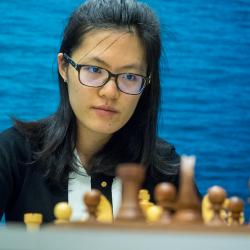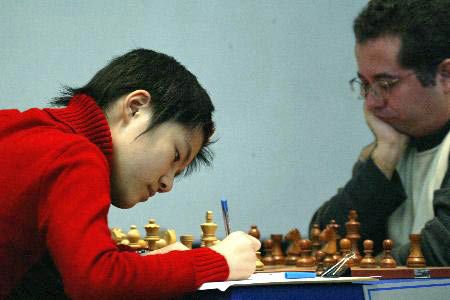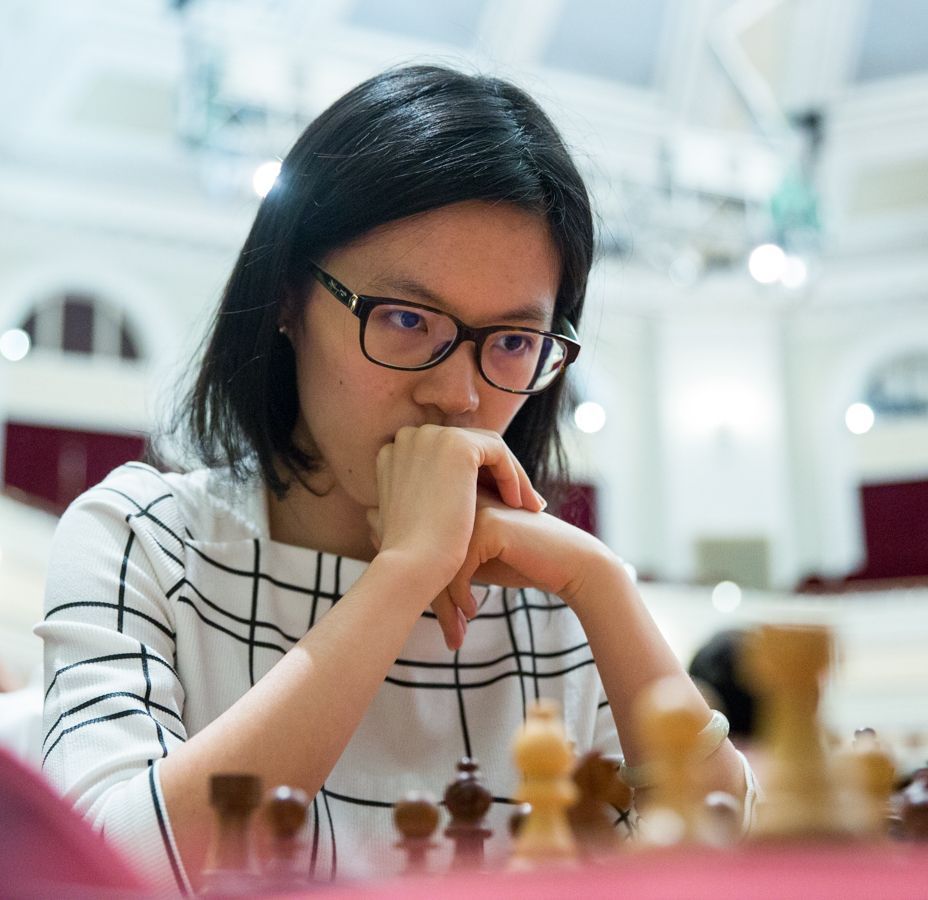GM Hou Yifan

Bio
Despite being in only her mid-20s, Hou Yifan is widely considered to be the second-strongest female chess player in history (behind Judit Polgar). Among her top accomplishments are the four Women’s World Chess Championships Hou won before declining to participate in the event. She’s also a chess prodigy. Her first women’s world title came at 16 years of age—three years after becoming the youngest female grandmaster in history.
There’s no question that Hou is the best active female chess player. The real mystery is where she will go next in chess. Unfortunately, she has largely stepped away from tournament play as she obtained a master’s degree at Oxford University as a Rhodes scholar and then started working full time at Shenzhen University in July 2020.
In 2021 and 2023, she won the Women's Speed Chess Championship on Chess.com, both times defeating GM Harika Dronavalli in the Final.
- Early Chess Career (1997 To 2007)
- Youngest Female Grandmaster In History (2008 To 2009)
- Four-time (And Youngest-ever) Women's World Champion (2010 To 2016)
- First Woman To Win Biel Chess Festival (2017 To 2020)
- Present And Future
Early Chess Career (1997 To 2007)
Hou learned how to play chess when she was three years old. By five years of age, she was playing the game regularly and started to receive coaching from IM Tong Yuanming.
It didn’t take long for Hou to demonstrate her incredible chess talent. In 2003, at nine years old, she won the Girls U10 World Youth Chess Championship. One year later, she moved to Beijing to study at the National Chess Center and placed third at the Open U10 World Championship.
In 2005 as an 11-year-old, Hou qualified for the World Women’s Chess Championship (to be held the following year) by winning a Chinese Women’s Zonal tournament with 6/9 points. The same year she was the youngest person to play in the World Team Chess Championship.

Hou had a breakout performance in the Women’s World Chess Championship in March 2006. The 12-year-old was ranked 56th out of 64 players (rated 2269), but beat IM Nadezhda Kosintseva (rated 2480) in the first round and then beat two-time European Women’s Championship winner (in 2000 and later in 2015) WGM Natalia Zhukova (rated 2432) in the second round. Hou lost in the third round and finished with a performance rating of 2504. Later in the year she won bronze in her debut of the Chess Olympiads, scoring an impressive performance rating of 2596. That year she also placed second in the girl’s section of the World Junior Chess Championship.
In 2007 Hou competed in the inaugural women’s section of the World Chess Team Championship. She scored 7.5/9 points on board two, winning individual gold as well as team gold for China (Hou led China to gold in the next two competitions in 2009 and 2011). The next month she won the Chinese Women’s Chess Championship, becoming the youngest (at 13) to do so. Hou went undefeated with seven wins and four draws, and earned a performance rating of 2585.
Youngest Female Grandmaster In History (2008 To 2009)
A highlight for Hou in 2008 came when she won the Chinese Women’s Championship a second consecutive time. Once again she finished undefeated with seven wins and four draws. This time she earned a performance rating of 2599. Months later she made history by earning her third and final GM norm.

By earning the prestigious grandmaster title at 14 years, six months and 16 days of age, Hou became (and is still) the youngest female in history to receive the distinction. She also became one of the youngest overall grandmasters—in fact, at the time of publishing in February 2020, she’s number-23 on the list of the youngest chess grandmasters.
Around the same time as earning her GM title, Hou competed in her second Women’s World Chess Championship. Seeded third among 64 players, she didn’t disappoint, defeating five opponents including Humpy Koneru—the second-youngest female GM in history—in the semifinals. However, Hou lost the final to Alexandra Kosteniuk.
Later in November Hou played in the Chess Olympiads again for China. Although her team didn’t place in the event, she finished third individually for her performance on board one.
In 2009 Hou placed in the top 10 at the Asian Chess Championship, which qualified her for the 2009 Chess World Cup (she lost in the first round to GM Arkadij Naiditsch). In August she won the “best female prize” at the Jubilee Open, where she placed in joint 17th place with 6.5/9 points.
Four-time (And Youngest-ever) Women's World Champion (2010 To 2016)
Hou captured individual and team gold (Chinese women’s) in the 16th Asian Games, which took place in November 2010. Her 8.5/9 points earned her a remarkable performance rating of 2798. As notable as that tournament was, what she did the next month was even more impressive.
Rated number-three in the Women’s World Chess Championship, 16-year-old Hou won five consecutive two-game matches—including 1.5-0.5 victories against both number-11 Kateryna Lagno and number-two Humpy Koneru—to reach the finals against Chinese WGM Ruan Lufei. After splitting the classical games 2-2, Hou won the rapid tiebreak games 3-1 (5-3 overall) to win the title. At 16 years of age, Hou became the youngest women’s world chess champion in history. She’s still the youngest female world champion ever.
Hou wasn’t finished capturing women’s world championships. The next year she faced Koneru in a 10-game match and won it early after scoring three wins and five draws. That made two world titles for the 17-year-old prodigy.
In 2012, however, the champion had no privileges—the format was a 64-player knockout tournament, and Hou lost in the second round. Things went back to normal in 2013. It was a 10-game match again, and Hou, because she had won the FIDE Women’s Grand Prix 2011-2012, qualified for the match against defending champion Anna Ushenina. Hou defeated Ushenina with four wins and three draws, winning the world title match early.
The next championship match in 2015 went back to a knockout tournament, and Hou, unable to make the event, lost the title by default. She showed up for the 2016 Women’s World Chess Championship, which went back to the 10-game match format. After qualifying for the match by winning the FIDE Women’s Grand Prix 2013-2014, Hou defeated defending champion Mariya Muzychuk (early) with three wins and six draws.
That gave Hou four world championships. It’s difficult to pin down what is more spectacular. Is it the 16-year-old taking care of the 64-player field of the 2010 knockout tournament? Or is it how the next three world championship matches—in 2011, 2013 and 2016—were all clinched early and without a single loss? Whatever the case may be, 2016 was Hou’s final involvement in the Women’s World Chess Championship. A couple of months after her victory, she dropped out of the cycle, citing objections to the format; primarily, she didn’t like the back-and-forth between knockout tournaments and matches.
What Hou accomplished at the Women’s World Chess Championships are the resounding highlights for this period of her career, but other performances should be noted. In 2011, she scored 5/7 points on board one to lead the Chinese women to gold at the Women’s World Chess Team Championships. The next year she lost the first-place playoff against Nigel Short in the 2012 Gibraltar Masters. In that tournament, Hou beat four players rated at least 2700: Zoltan Almasi (2717), Le Quang Liem (2714), Alexei Shirov (2710) and Judit Polgar (2710)—it was Polgar’s first loss to a female in 22 years. Hou put an end to another Polgar streak at the same tournament three years later. At Gibraltar Chess Festival 2015, Hou tied for third place, and her rating surpassed Polgar’s highest mark. That put an end to Polgar’s 26-year reign as the top-rated women’s player.
First Woman To Win Biel Chess Festival (2017 To 2020)
Hou had two noteworthy games at the Tradewise Gibraltar Chess Festival and Grenke Classic in 2017. At the former tournament in January, she played an exceptional positional queen sacrifice in her win against IM Borya Ider. In April she beat then-world number-three Fabiano Caruana at the Grenke Chess Classic.
Clearly, however, the highlight for Hou in 2017—and likely for this most recent period of her chess career—is her historic victory in Biel. In the 50th edition of the Biel Chess Festival, she became the first woman to win the tournament. She did so with 6.5/9 points and a performance rating of 2810.

Hou played in a few more tournaments after that. However, due to her studies at Oxford, which began in September 2018, she hasn’t been very active in tournament chess. There was some hope that she’d rejoin the cycle and again compete for the Women’s World Chess Championship. That’s because in 2019 FIDE announced that it put an end to alternating between a title match and a knockout tournament—which is why Hou chose to withdraw from the cycle in 2016.
Unfortunately, scheduling didn’t allow her to take part in the 2019 Women’s Candidates Tournament. “I cannot take part due to the conflicts of dates as the playing period is during trinity term here at Oxford, and it is very difficult to get permission to play a chess tournament, though I have tried hard to negotiate,” Hou told Chess.com. “Apart from the fact, I actually communicated with FIDE [a] couple of times in advance to discuss the possibility of changing the playing dates. Unfortunately it doesn't work out according to FIDE.”
Present And Future
Hou is still not active in high-level chess events at the time of publishing in February 2020. In an interview with Chess.com in late 2019, Hou expressed that she doesn’t have much time for chess alongside her education. And she reaffirmed how chess isn’t the top priority in her life.
“For me, chess is mostly a passion,” Hou said when explaining her approach to chess. “It’s never a career for me. I love chess; I like to try and explore new stuff, and the deeper you go, you realize there’s more things you don’t know. I really enjoy playing but because it’s a passion; sometimes in tournaments I don’t always make the most practical decisions.”
On July 10, 2020, Hou added another prestigious title to her resume as she became the youngest ever professor at Shenzhen University, a full-time position.

It’s unclear exactly how Hou will balance chess with her short-term (academy work) and long-term (a different career than chess) priorities and goals. Will she largely forego chess or make time for it alongside her other ambitions? Or could she change her mind and rededicate herself to chess? Still in her mid-20s and as the second-best female chess player in history, Hou has a lot of potential remaining for chess. Time will tell if the chess world gets to experience it.


